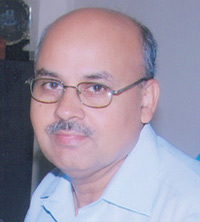 Dr. S S Jena
Dr. S S Jena
Chairman, National Institute of Open Schooling (NIOS)
How does NIOS ensure the quality of academic support to its students?
NIOS offers academic programmes not only at the levels of Secondary and Sr. Secondary classes but also offers vocational courses primarily devoted for skill development of the work force mostly engaged in the un-organised sectors. It also offers equivalency programmes for neo-literates through its Open Basic Education programmes.
NIOS reaches out to its learners through its Accredited Institutions (study centres) for its academic programmes and through Accredited Vocational Institutions (AVIs) for its vocational programmes to support academic components of the programmes. It basically uses multi-channel and multi-media delivery modes of course contents for its learners
NIOS generates funds by way of collection of admission and examination fees, sale of publications, etc. Budgetary support to NIOS is also provided by the Ministry of Human Resource Development, Government of India under the Plan grant.
What role is NIOS playing in reaching to the disadvantaged sections of the population?
The NIOS provides an opportunity for learning to all those who wish to resume or continue their studies. Special efforts are being made to reach out to rural population, urban poor, women, scheduled castes and tribes, differently abled persons, handicapped youth, unemployed or part employed persons and school dropouts.
NIOS has been identified as a lead institution by the National Monitoring Committee for Minority Education (NMCME) for providing linkage of minority educational institutions such as Madarsas, Maktabs and Darul-Uloom with the educational mainstream.
Please share the vision and prospective plan of NIOS.
Our focus in recent years has been a transition from print based instruction system to e-learning mode of knowledge dissemination. For this, a system needs to be developed to reach the target groups using multi-mode and multi-channel delivery mechanism suited to the varied needs of the learner groups in different contexts.
NIOS took a significant step of providing the facility of On-line registration for admissions and examinations under the NIOS Online Ni-On Project. NIOS envisages providing to the learners the facility of education through virtual classrooms.
Can you mention some of the initiatives of NIOS?
- The NIOS Online (Ni-On) Project offers admissions to interested learners through its website.
- The HUNAR Project is a path breaking initiative of the NIOS in collaboration with the Bihar Education Project Council (BEPC) to provide training and upgradation of skills for Muslim girls. Skill training is provided in seven courses namely Gram Sakhi, Jute Production, Cutting and Tailoring, Early Childhood Care and Education, Basic Rural Technology, Bakery and Confectionery and Beauty Culture.
- We conduct two public examinations in a year. In order to introduce more flexibility in its system, we conduct On-Demand examinations at the Secondary and Senior Secondary levels enabling learners to register and appear in the examination whenever they feel prepared.
Have you entered in any Public-Private Partnerships in the field of vocational education and training?
Yes, most of our partner institutions for our vocational programmes are established under PPP model. Recently, we have signed an MOU with CISCO for offering hardware courses on electronics with the support of training institutions of CISCO. In fact, we are in the process of evolving a workable model with the help of many specialised institutions for the skill development process under the vocational education programmes targeted mostly for those in the un-organised sectors.
Please share the strategies undertaken by NIOS.
‘Learner Satisfaction’ is a thrust area on which one has to give considerable thought. The student support services, therefore, needs to be strengthened further. Apart from the government institutions, the resources available with the NGOs and civil societies need to be tapped for changing the direction of the present open education movement towards the rural and disadvantaged segment of the society.




















